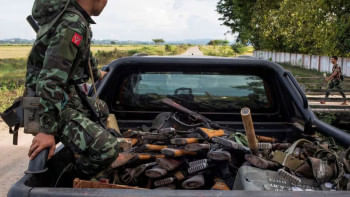The safety of our border residents is paramount

We are concerned about the escalating security threat to our border with the Rakhine state of Myanmar, which in recent days saw intense fighting between junta forces and the Arakan Army. Far from being contained at source, however, the conflict has seen undesirable spillovers reaching Bangladesh. Throughout Sunday, there were reports of bullets, explosives and even mortar shells falling on our border at the Naikhhongchhari upazila of Bandarban, terrifying local residents and injuring several of them. On Monday afternoon, two people, including a woman, were killed by a misdirected mortar shell, marking the first such casualties. But why would our citizens have to die or live in fear because of conflicts on the Myanmar side of the border? This is totally unacceptable.
Under no circumstances can the internal security situation of a country be allowed to compromise that of another country. The latest flare-up in the fight between the junta and the Three Brotherhood Coalition—made up of armed ethnic groups including the Arakan Army—has had spillover effects for other neighbours of Myanmar as well. Unfortunately, Bangladesh has had to see the worst of it, most notably after a military crackdown in 2017 that led to the forced exodus of nearly a million Rohingya to Bangladesh. Already, there are reports of displaced Myanmar nationals waiting to enter Bangladesh. Since early Sunday, about a hundred security personnel of that country, many injured, have crossed the border to seek refuge.
While Bangladesh again set examples of good neighbourly behaviour by giving them shelter and treatment, we should not lose sight of the potential ramifications of this situation. Bangladesh shares about a 283-kilometre border with Myanmar, which mostly falls in Bandarban and Cox's Bazar districts. A fluid security situation in Myanmar not only poses fresh exodus concerns or a threat to our border communities, but also raises the prospects of armed insurgents entering or regrouping in Bangladesh, which may compromise our long-term security. It also makes the prospects of Rohingya repatriation more uncertain.
Against this backdrop, Bangladesh government has reportedly called for China's intervention. It has also vowed to not accept any more refugees from Myanmar. While efforts like this are crucial, we must also strengthen border security to protect our people. Amid escalating tensions, border residents are reportedly fleeing their homes, leaving behind belongings and livestock. We cannot be silent spectators in this chaos. The government must do everything it can to contain the effects of Myanmar's continuing civil war on our soil.


 For all latest news, follow The Daily Star's Google News channel.
For all latest news, follow The Daily Star's Google News channel. 









Comments